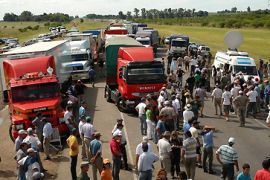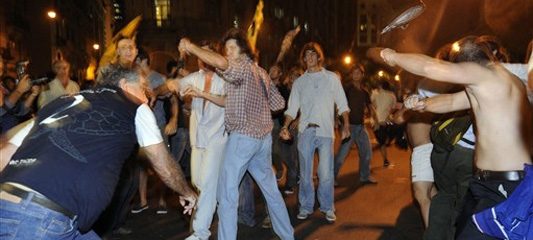Argentina strike talks rejected
President says farmers must end their protests before negotiations begin.

 |
| Clashes have erupted between farmers and government supporters [AFP] |
Cristina Kirchner, the president of Argentina, has told farmers to lift their two-week strike over export taxes or the government will refuse to negotiate with them.
The nationwide farm strike has caused food shortages in one of the world’s biggest agricultural producers, and halted grain exports to key markets in China, Europe and elsewhere.
|
The government’s doors are open but please, lift this strike for the sake of the people |
“The government’s doors are open but please, lift this strike for the sake of the people,” Kirchner said in a televised address.
Farmers have maintained roadblocks at key rural roads, held protests and marched through cities across the country’s agricultural heartland.
Kirchner said she would not negotiate “with a pistol pointed at the head,” and said the blockades, which cut off the flow of farm goods to cities, were an attack against all Argentinians.
Farm leaders met earlier on Thursday to discuss a possible 48-hour suspension of the strike, but had no immediate reaction to Kirchner’s speech.
Sporadic violence
| Argentina’s economic woes |
 Although rich in natural resources, Argentina’s 39.5 million population has suffered in several economic crises in recent decades Fiscal deficits, high inflation and mounting debts culminated in 2001’s economic crisis, which sparked protests, currency devaluation and debt defaults Sixty per cent of Argentinians were also pushed below the poverty line C ountry’s main exports include soybeans, corn, wheat, petroleum, gas and vehicles Inflation is currently in double figures and farmers say recent tax increases on goods such as soybeans, sunflower oil and beef by up to 45 per cent to boost revenues will cripple their livelihoods Source: CIA World Factbook |
The farmers went on strike to protest a recent rise in export taxes on soya, which is fetching high prices on global markets.
The taxes, of up to 45 per cent, were imposed on a range of goods including soybeans, sunflower oil and beef in a bid to boost state revenue at a time of exceptionally high commodity prices and to curb high inflation in the country.
Farmers in Argentina, the world’s largest soya bean exporter, say the taxes have hit them hard.
There has been sporadic violence this week between protesters who support the farmers, many of whom come from Argentina’s more wealthy middle class, and activists supporting the government.
There were reports of frustrated truckers and farmers clashing in some areas on Thursday, including in the central province of Cordoba, where truck drivers unsuccessfully tried to force their way through a blockade.
There was also further evidence of the food shortages that have gripped the country.
“There is practically zero beef in Buenos Aires,” said Alberto Williams, the vice president of the butchers’ association for the city.
The army was ordered on Wednesday to give up some of its meat supplies to make up for the shortfall, while Anibal Fernandez, the justice minister, warned that the farmers blocking the roads could face jail.